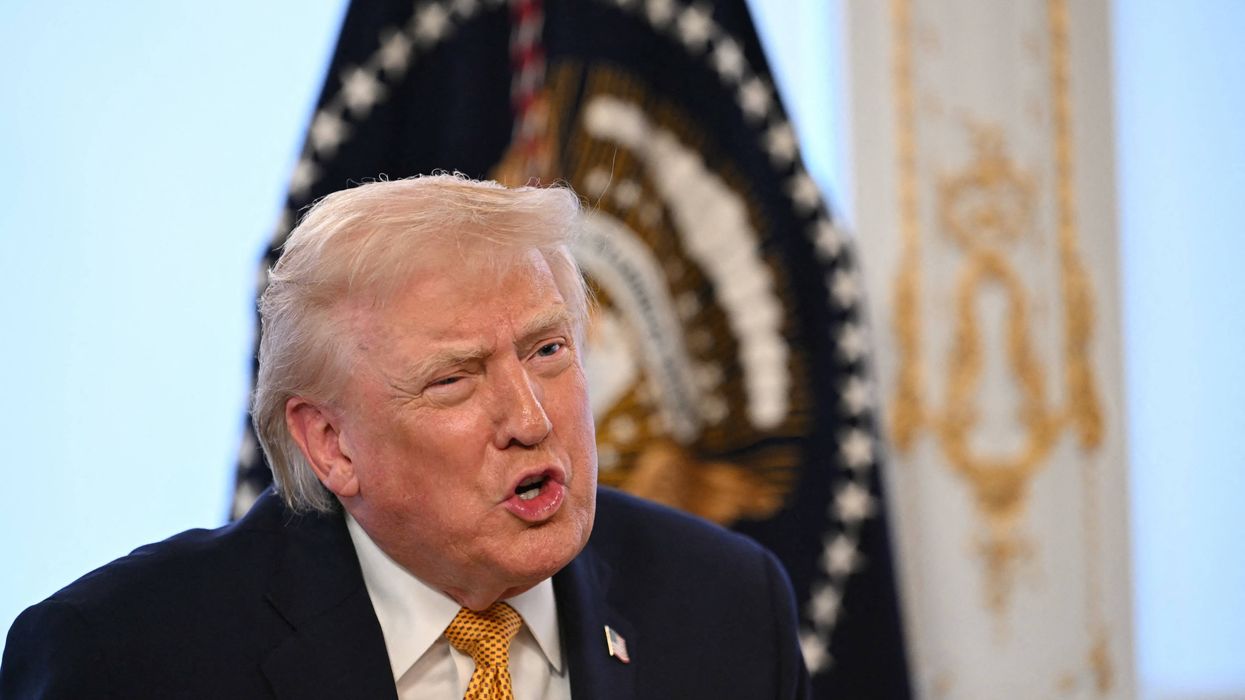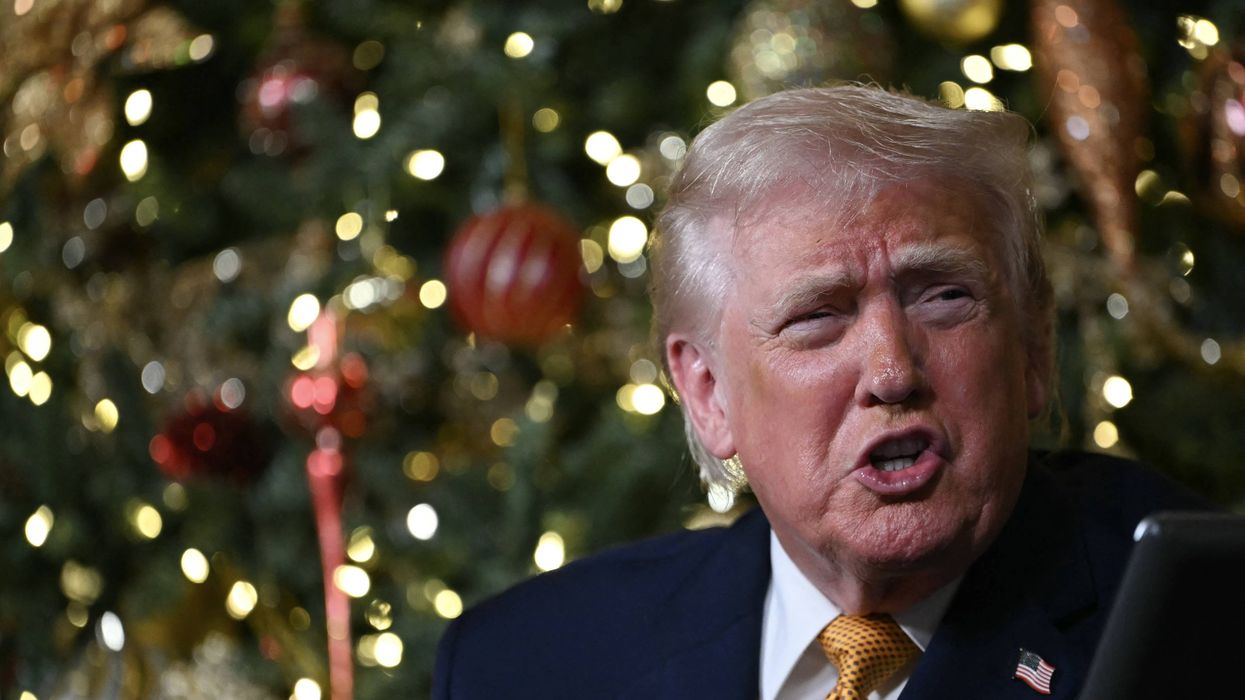August, 22 2008, 11:47am EDT
For Immediate Release
Contact:
Derek Goldman, Endangered Species Coalition
(406) 370-6491
dgoldman@stopextinction.org
Tara Thornton, Endangered Species Coalition
(207) 268-2108
tthornton@stopextinction.org
104 Citizens Groups Criticize Anti-Democratic Rulemaking
Bush Administration to Cripple Endangered Species Act With Little Public Input, Oversight
WASHINGTON
Today, representatives from 104 conservation and
scientific organizations representing millions of American's submitted a
letter to Secretary of the Interior Dirk Kempthorne and Secretary of Commerce
Carlos Gutierrez calling for increased transparency and opportunities for
public participation on a new rule proposal. The rule, published by the Bush
administration in the federal register last week, would radically weaken the
Endangered Species Act. The administration is only accepting public comment for
30 days.
"Rather than a narrow tweaking of the regulations, the proposal
represents a back-door attack on the Endangered Species Act. The American
people deserve and expect a full public process to vet such far-reaching
changes to this landmark conservation law," said Leda Huta, Director of
the Endangered Species Coalition.
The administration is also refusing to accept e-mail comments or hold
public hearings on the proposed rule. Instead, comments will be accepted by
mail, or through a government Web
site that warns reviewers their personal information will be posted on the
internet for public dissemination.
"It appears as if the administration is doing whatever it can to
discourage participation in the democratic process," said John Kostyack,
of the National Wildlife Federation. "I think we can expect more sneaky
assaults like this on our public land and wildlife laws as this Administration
heads for the exits."
The Associated
Press, reporting on leaked documents, revealed last week that the Bush administration plans to weaken the Endangered
Species Act. The proposed changes are intended to eliminate
the requirement that federal agencies consult with independent wildlife experts
and to prohibit consideration of the impacts of global warming on wildlife.
"The Bush administration proposal eliminates the critical checks
and balances needed to protect imperiled birds and cuts species experts
from the process of making decisions that need to be science-based," said
Mike Daulton, with National Audubon Society.
"The Endangered Species Act is a safety net for our
nation's wildlife, fish and plants on the brink of extinction. The
Bush administration's proposed regulations will cut a giant loophole in
the safety net," said Bill Snape of the Center for Biological Diversity.
"We have a responsibility to future generations to be good stewards and
protect endangered species and the special places they call home."
The Intergovernmental Panel on Climate Change concluded last year that
nearly one-third of plant and animal species on Earth are at an increased risk
of extinction due to global warming.
"Animals on the brink of extinction need consideration and
protection guided by the best experts in the federal government: US Fish and
Wildlife Service and National Marine Fisheries Service biologists," said
Susan Holmes of Earthjustice.
The proposed regulatory changes came out in the eleventh hour of the
Bush administration. The abbreviated timeline and restrictive commenting
options raise serious concerns that the Department of the Interior and the
Department of Commerce is attempting to rewrite a bedrock environmental statute
without allowing for adequate public involvement.
The proposed regulatory changes were published August 15, 2008, while
Congress was out for recess and many Americans were enjoying the summer
holiday.
Sean Cosgrove with the Conservation Law Foundation agrees, "For
one of our nation's most important and successful environmental laws, the
thirty-day comment period is woefully inadequate for the public to review and
comment on this critical proposal."
The coalition is urging DOI and DOC
to extend the comment period to 120 days, allowing the public adequate time to
address the breadth and depth that these changes to the Endangered Species Act
regulations will have on protecting our most imperiled wildlife.
The Endangered Species Coalition's mission is to stop the human-caused extinction of our nation's at-risk species, to protect and restore their habitats, and to guide these fragile populations along the road to recovery.
LATEST NEWS
Bezos-Owned Newspaper Bashes Medicare for All in Christmas Day Editorial
The Washington Post editorial predictably ignores research showing that a single-payer system would save hundreds of billions of dollars—and tens of thousands of lives—each year.
Dec 26, 2025
An editorial published on Christmas by the Jeff Bezos-owned Washington Post inveighed against supporters of Medicare for All in the United States, pointing to the struggles of Britain's chronically underfunded National Health Service as a "cautionary tale" while ignoring research showing that a single-payer system would save the US hundreds of billions of dollars and tens of thousands of lives each year.
The editorial, headlined "Socialized medicine can’t survive the winter," laments the "religious-like devotion to the NHS" in the United Kingdom even as "hospital corridors overflow and routine procedures get canceled due to a catastrophic event commonly known as 'winter.'"
The Post editorial board, led by opinion editor Adam O'Neal, waves away expert analyses showing that the UK government is underinvesting in its healthcare system relative to other countries in Europe, resulting in the kinds of problems the Thursday editorial attributed to the supposedly inherent flaws of single-payer systems.
"This is the dark reality of single-payer and a cautionary tale for the third of Americans who mistakenly believe Medicare for All is a good idea," the editorial declared ominously.
The editorial understates Medicare for All's popularity among US voters. A recent Data for Progress survey found that even after hearing common opposing arguments, 58% of voters strongly or somewhat support improving Medicare and expanding it to cover everyone in the US.
A separate poll conducted by GQR Research found that 54% of voters nationally, and 56% in battleground districts, support Medicare for All. US Rep. Pramila Jayapal (D-Wash.), the co-leader of the Medicare for All Act in the House, is reportedly planning to present those findings to colleagues next month as she pushes Democrats to rally behind her legislation ahead of the critical midterm elections.
Welcome to the newest co-sponsors of my Medicare for All bill in the House!
Medicare for All is not only good policy — as premiums skyrocket for millions of Americans — it is incredibly popular. Let’s keep building momentum for universal health care and get this passed! pic.twitter.com/k5sg7hEkYR
— Rep. Pramila Jayapal (@RepJayapal) December 25, 2025
The renewed push for Medicare for All comes as the corporate-dominated healthcare status quo hits Americans with massive premium hikes stemming from congressional Republicans' refusal to extend Affordable Care Act tax credits.
Predictably, the Post's editorial board—which Bezos has instructed to write "every day in support and defense of two pillars: personal liberties and free markets"—neglected to mention the myriad horrors of the United States' for-profit system in its diatribe against Medicare for All.
The editorial also ignores research showing potentially massive benefits from a transition to Medicare for All, which would virtually eliminate private insurance while providing comprehensive coverage to everyone in the US for free at the point of service.
One study published in The Lancet estimated that a Medicare for All system would save more than 68,000 lives and over $450 billion in healthcare expenditures annually.
An analysis by Yale researchers calculated that "if the US had had a single-payer universal healthcare system in 2020"—which marked the onset of the Covid-19 pandemic—"nearly 212,000 American lives would have been saved that year" and "the country would have saved $105 billion in Covid-19 hospitalization expenses alone."
Keep ReadingShow Less
US Launches Christmas Strikes on Nigeria—the 9th Country Bombed by Trump
Trump—who calls himself "the most anti-war president in history"—has now bombed more countries than any president in history.
Dec 25, 2025
President Donald Trump—the self-described "most anti-war president in history"—has now ordered the bombing of more countries than any president in history as US forces carried out Christmas day strikes on what the White House claimed were Islamic State militants killing Christians in Nigeria.
"Tonight, at my direction as Commander in Chief, the United States launched a powerful and deadly strike against ISIS Terrorist Scum in Northwest Nigeria, who have been targeting and viciously killing, primarily, innocent Christians, at levels not seen for many years, and even Centuries!" Trump said Thursday in a post on his Truth Social network.
"I have previously warned these Terrorists that if they did not stop the slaughtering of Christians, there would be hell to pay, and tonight, there was," the president continued. "The Department of War executed numerous perfect strikes, as only the United States is capable of doing."
"Under my leadership, our Country will not allow Radical Islamic Terrorism to prosper," Trump added. "May God Bless our Military, and MERRY CHRISTMAS to all, including the dead Terrorists, of which there will be many more if their slaughter of Christians continues."
A US Department of Defense official speaking on condition of anonymity told the Associated Press that the United States worked with Nigeria to conduct the bombing, and that the government of Nigerian President Bola Tinubu—who is a Muslim—approved the attacks.
It was not immediately known how many people were killed or wounded in the strikes, or whether there are any civilian casualties.
The Nigerian Ministry of Foreign Affairs said that “terrorist violence in any form, whether directed at Christians, Muslims, or other communities, remains an affront to Nigeria’s values and to international peace and security."
The US bombings followed a threat last month by Trump to attack Nigeria with “guns-a-blazing" if the country's government did not curb attacks on Christians.
Northwestern Nigeria—including Sokoto, Zamfara, Katsina, and parts of Kaduna State—is suffering a complex security crisis, plagued by armed criminal groups, herder-farmer disputes, and Islamist militants including Islamic State West Africa Province (ISWAP/ISIS) and Boko Haram. Both Christians and Muslims have been attacked.
Since emerging in Borno State in 2009, Boko Haram has waged war on the Nigerian state—which it regards as apostate—not against any particular religious group. In fact, the majority of its victims have been Muslims.
"According to the Armed Conflict Location and Event Data Project, more Muslims than Christians have been targeted in recent years," Chloe Atkinson recently wrote for Common Dreams. "Boko Haram has massacred worshipers in mosques, torched markets in Muslim-majority areas, and threatened their own coreligionists."
"The crisis in Nigeria is not a holy war against Christianity."
"It is true that Christian communities in the north-central regions have suffered unimaginable horrors as raids have left villages in ashes, children murdered in their beds, and churches reduced to rubble," she said. "The April massacre in Zike and the June bloodbath in Yelwata are prime examples of the atrocities taking place in Nigeria."
"The crisis in Nigeria is not a holy war against Christianity," Atkinson continued. "Instead, it’s a devastating cocktail of poverty, climate-driven land disputes, and radical ideologies that prey on everyone and not just any distinct group."
"By framing Nigeria’s conflict as an existential threat to Christians alone, Trump is not shining a spotlight on the victims," she added. "Instead, he is weaponizing right-wing conspiracy theories to stoke Islamophobia, the same toxic playbook he used to fuel his ban on Muslims, and which left refugee families shattered at America’s borders."
Former libertarian US Congressman Justin Amash (R-Mich.) noted on X that "there’s no authority for strikes on terrorists in Nigeria or anywhere on Earth," adding that the 2001 Authorization for Use of Military Force (AUMF)—which was approved by every member of Congress except then-Rep. Barbara Lee (D-Calif.)—"is only for the perpetrators of the 9/11 attacks."
"The War Powers Resolution doesn’t grant any authority beyond the Constitution," Amash added. "Offensive military actions need congressional approval. The Framers of the Constitution divided war powers to protect the American people from war-eager executives. Whether the United States should engage in conflicts across the globe is a decision for the people’s representatives in Congress, not the president."
In addition to Nigeria, Trump—who says he deserves a Nobel Peace Prize—since 2017 has also ordered the bombing of Afghanistan, Iran, Iraq, Libya, Pakistan, Somalia, Syria, and Yemen, as well as boats allegedly transporting drugs in the Caribbean Sea and Pacific Ocean. Trump has also deployed warships and thousands of US troops near Venezuela, which could become the next country attacked by a president who campaigned on a platform of "peace through strength."
That's more than the at least five countries attacked during the tenure of former President George W. Bush or the at least seven nations attacked on orders of then-President Barack Obama during the so-called War on Terror, which killed more than 940,000 people—including at least 432,000 civilians, according to the Costs of War Project at Brown University's Watson Institute for International and Public Affairs.
Trump continued the war on ISIS in Iraq and Syria started by Obama in 2014. Promising to "bomb the shit out of" ISIS fighters and "take out their families," Trump intensified the US campaign from a war of "attrition" to one of "annihilation," according to his former defense secretary, Gen. James "Mad Dog" Mattis. Thousand of civilians were killed as cities such as Mosul, Iraq and Raqqa, Syria were flattened.
Trump declared victory over ISIS in 2018—and again the following year.
Some social media users suggested Trump's "warmongering" is an attempt to distract from the Epstein files scandal and alleged administration cover-up.
"Bombing Nigeria won’t make us forget about the Epstein files," said one X user.
Keep ReadingShow Less
'Unhinged' Trump Wishes 'Merry Christmas to All, Including the Radical Left Scum'
"Nothing more Christian than to be a hateful wretched fuck on Jesus’ birthday," quipped one critic.
Dec 25, 2025
In a message called typically on-brand by observers, US President Donald Trump wished "Merry Christmas to all"—including his political opponents, whom he described in decidedly unchristlike language.
"Merry Christmas to all, including the Radical Left Scum that is doing everything possible to destroy our Country, but are failing badly," Trump said Christmas Eve on his Truth Social network.
"We no longer have Open Borders, Men in Women’s Sports, Transgender for Everyone, or Weak Law Enforcement," the president added. "What we do have is a Record Stock Market and 401K’s, Lowest Crime numbers in decades, No Inflation, and yesterday, a 4.3 GDP, two points better than expected. Tariffs have given us Trillions of Dollars in Growth and Prosperity, and the strongest National Security we have ever had. We are respected again, perhaps like never before. God Bless America!!!"
While nothing new—Trump has used past Christmas messages to tell people he doesn't like to "go to hell" and "rot in hell"—observers, including some MAGA supporters, were still left shaking their heads.
"Radical Left Scum" 😂🤣😂🤣😂🤣Christmas greetings from a liar, traitor, pedophile, and overall shitstain upon society.
[image or embed]
— Bill Madden (@maddenifico.bsky.social) December 24, 2025 at 9:00 PM
"Nothing more Christian than to be a hateful wretched fuck on Jesus’ birthday!" liberal political commentator Dean Withers said on X.
Another popular X account posted: "A sitting president of the United States using Christmas Day to spew venom at fellow Americans he calls 'Radical Left Scum' isn’t just unpresidential—it’s unhinged, un-Christian, and utterly beneath the office."
"This is the behavior of a bitter, small man who can’t even pretend to unify for one holy day," she added. "Shameful. Disgraceful. Pathetic."
Keep ReadingShow Less
Most Popular


